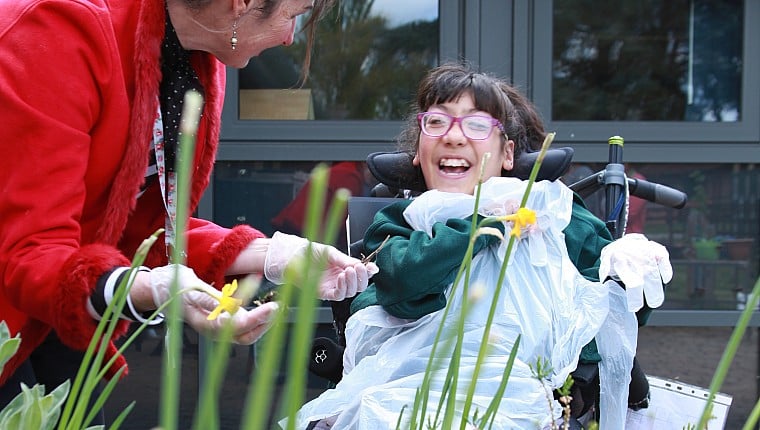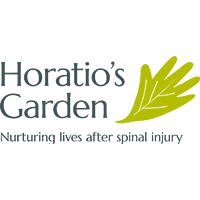The joy of gardening for all abilities

For pupils at Treloar School & College in Hampshire, the UK’s leading centre for severely disabled children and young people, opening the doors to a two-hour outdoor lesson is a treat in the spring sunshine. There’s a courtyard with raised beds for ease of access; one with flowers and scented plants, another is filled with herbs, the third has carrots and leeks interlaced with purple phlox. The herbs and vegetables they grow here are used to make delicious soups and bakes but today the area is in need of a good spring clean ahead of the growing season.
Four tasks are set; weeding the raised beds, replenishing and repositioning the bird feeder, sorting the plant pots and pressing flowers to create bunting for the Treloar’s tea party.
The bunting making, which involves selecting flowers and placing them between white cotton and bashing them with a mallet is by far the favourite activity and the results are stunning. Dandelions, carrot leaves, pansies and phlox create delicately colourful folios which will look perfect at a summer tea party. Everyone is delighted with the results.

Emo, Leyla and Ella collect flowers for the bunting
Marcia, who is the only one to volunteer for the weeding, feels and smells the soil, enjoys the scent of rosemary and lavender, but isn’t so keen on the mint, and selects the weeds to be pulled before helping to water the beds and is justifiably pleased with the results.
Sorting the pots for a scarecrow they plan to make is a tougher job, and only Emo is brave enough to take on the challenge. Recycling the plastic pots for another creative activity is a great way to re-use the pots not needed for potting on the seedlings they have grown. The whole class comes together however, to help Isabel with the bird feeder.
Isabel is blind but she loves to hear the birdsong and has asked for the bird feeder to be moved closer to the classroom so they can listen to and watch the birds. Repositioned close to the raspberries, all the pupils help fill the feeders with nuts and sunflower seeds and direct their carers to where they want them hung.
At the end of two thoroughly enjoyable hours there is universal approval from pupils and carers for all they have achieved and growing excitement about the plans for the new Outdoor Learning Centre that is being funded by the National Garden Scheme at the School & College.
“It’s so wonderful for the children to get outside and to interact with nature,” says class teacher Katherine. “It adds a valuable and important dimension to their learning and development. You can clearly see the joy on student’s faces which demonstrates how much they love being outdoors. There are so many health and wellbeing benefits too that we like to encourage our students to spend as much time outdoors with nature as possible.”
“It’s thanks to everyone visiting National Garden Scheme gardens that we are able to fund gardens for a number of health and disability charities,” says National Garden Scheme CEO George Plumptre. “Supporting Treloar’s with a new Outdoor Learning Centre to complement the other onsite, outdoor learning facilities will offer more vocational learning opportunities and therapeutic benefits for students ensuring that gardens are accessible to all.”
Around 170 children and young people, aged between 2 and 25 years, attend the School and College. The focus is on students’ abilities rather than their disabilities and helping them to work towards a future that is as independent as possible.
For more on our funding at Treloar’s click here.

















